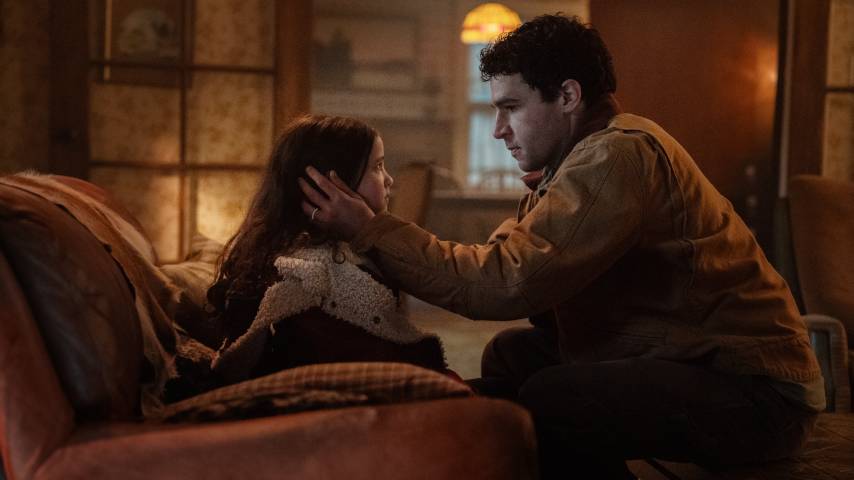Spoiler Space: Wolf Man passes on the pain of its predecessor
Leigh Whannell’s lycanthropic tale is a thematic packmate of George Waggner’s 1941 film The Wolf Man.
Photo: Universal Pictures
Spoiler Space offers thoughts on, and a place to discuss, the plot points we can’t disclose in our official review. Fair warning: This article features plot details of Wolf Man.
Of all the Universal monsters, The Wolf Man is perhaps the saddest. A man, aware of his own ticking-clock monstrosity, fights fruitlessly against the inevitable in order to protect those around him. Director George Waggner and writer Curt Siodmak made their Gothic tragedy in 1941, putting the oafish lug Larry Talbot (Lon Chaney Jr.) through the wringer with plenty of mythology and the subtext of Nazism’s transformation of seemingly everyday people. But what Leigh Whannell’s update Wolf Man inverts is The Wolf Man’s tragic relationship between father and son.
In The Wolf Man, Claude Rains (the Invisible Man himself) plays Larry’s loving, loaded father John. He’s a practical, science-oriented man of means, who lives in a Welsh castle and has just lost his eldest son in a hunting accident. When Chaney’s hyper-American goober stumbles back home, their relationship is strained but filled with potential…until Larry slays, and is bitten by, a werewolf. As evidence mounts that local deaths are due to the nighttime escapades of an infected Larry, the son becomes more and more fearful while the father (and a local posse of sensible authority figures) dismisses lycanthropy as nothing more than a psychological affliction suffered, if at all, by the underclasses. That said, John is notably protective of his boy, all but covering up the initial killing as an accident.
This makes it all the more painful when, at the film’s climactic conclusion, John must beat his own son to death with a silver-headed cane. This scene, beyond feeling weighty due to Chaney’s relationship with his own famous and monster-playing father, visually echoes the film’s first kill, where Larry initially slays the werewolf and is bitten in the process. It’s brutal, sad, and a smack in the face of futile parental protectiveness.
Wolf Man, too, is more of a bummer than anything else. But its version of this origin story leans further into dismantling that idea of protectiveness. Blake (Christopher Abbott) and his family return to his father’s Oregon farm after the missing dad is declared dead. The opening scene, a prologue to the story at hand, ends its werewolf encounter with Blake’s dad (Sam Jaeger) radioing his neighbor (and fellow father) about the creature they ran into. The implication is that the two dads are off a-hunting to ensure the safety of their children…which makes it all the more obvious who the werewolf who eventually infects Blake is.
Yes, Blake’s dad gets werewolfed while trying to keep his kid safe, then werewolfs his kid in turn. Generational trauma! Though the rest of Wolf Man muddles its way through this theme—Blake doesn’t get turned as a direct result of trying to protect his daughter, nor does his daughter ever seem under threat of being victim to his emotional or monstrous afflictions—the family dynamic is ever-present. When Wolf Man rolls out its werewolf fight between wolf-Blake and his dad, it’s not a “Hell yeah, werewolf fight!” moment. Instead, it’s got just as much pain as The Wolf Man’s ending, as two men who imperfectly cared for one another struggle to the death—this time as a direct result of one’s protective instincts.
Neither Wolf Man nor The Wolf Man has much to offer in way of resolution or reassurance. These endings are bleak, their losses painful, the aims of its characters ultimately reasonable. Chaney spent the rest of his Wolf Man movies searching for a cure (and getting into crossover hijinks). Blake finds a cure in the barrel of a gun, his desire to protect his family culminating in a moment of sacrifice. And yet, since he’s blown away right in front of his young daughter, it’s clear that the scars will live on. That’s an inevitability of parenting, even if most aren’t monsters.